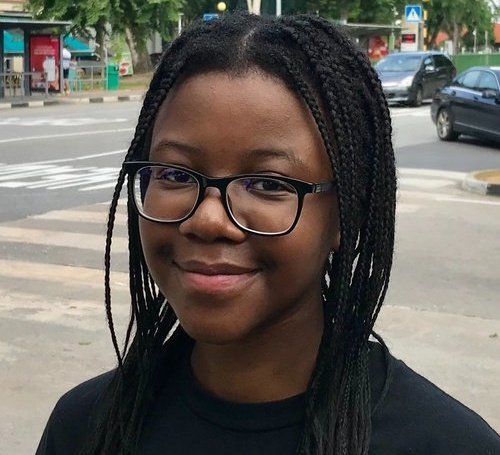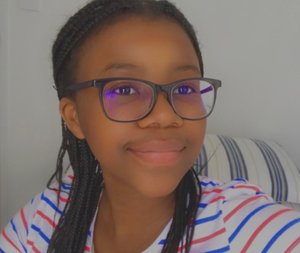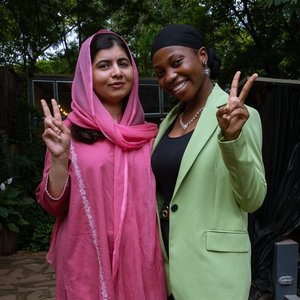How has Black beauty been colonized?
“It’s time our societies accepted Black people without needing us to conform to White beauty standards first,” writes 18-year-old student Petiri Ira. (Courtesy of Petiri Ira)
“It’s time our societies accepted Black people without needing us to conform to White beauty standards first,” writes 18-year-old student Petiri Ira.
When I was in third grade, I watched my friends slick their hair back in water after swimming lessons so they could look like mermaids. I wanted in on the fun too. But when I tried to slick my kinky hair back it did not stay down on my scalp. I remember my classmates laughing at my failed attempt to mimic them. I felt inferior to them and excluded — and this made me unhappy with my hair.
From then on, I wanted straight hair. I was tired of being bullied for my “different” hairstyles and my short, coarse, 4C-textured hair. I begged my mom to get my hair relaxed so I could look more like my White classmates. I even used to dream of waking up and having a lighter skin tone and long, blonde hair.
Growing up as a Black girl in predominantly White South African schools, my features and brown skin made me a frequent target for harassment. Once, a group of kids said they didn’t want to play with me because my “skin was brown.” Experiences like these created a sense of self-hatred and insecurity that I kept within me for years. I never felt comfortable talking to my White friends about disliking my features because they could not understand my struggle. Society praised their straight, brown and blonde hair and their blue and green eyes — not my “broad”, “flat” and “larger” nose or kinky hair. It was hard being a Black kid in an environment where I could not speak my truth.
When I moved to a predominantly Black high school, I was finally surrounded by students who looked like me. This was a chance for me to accept who I was and detach myself from looking at Whiteness as the default and acceptable standard. Making friends with students who embraced their Blackness helped me accept and love my own, especially growing up in an environment where I felt my Blackness was a problem and something to be dealt with. I felt seen and loved for who I was rather than what I looked like. It was only then I came to understand that my experiences were part of the broader history of colonization that established the Eurocentric beauty standards we live with today.
“Making friends with students who embraced their Blackness helped me accept and love my own.”
Colonialism began in the 15th century, when European countries like Britain, France, Portugal and Spain colonized lands across North and South America. These early colonizers wanted to exploit the resources of other countries in order to bolster their own economies and compete with one another over the glory of expansion. By 1914, Europeans had colonized a large number of the world's nations, establishing colonies in Africa, the Americas and Asia.
Colonialism championed a social hierarchy that was rooted in what we know today as featurism, prejudice against individuals with facial features that deviate from Eurocentric beauty ideals; colorism, prejudice or discrimination especially within a racial or ethnic group favoring people with lighter skin over those with darker skin; and texturism, the idea that only loose or defined curls deserve favoring or praise. In these societies, an individual’s proximity to White, European beauty standards defined their social rank, worth and value.
By the mid-20th century, many nations had achieved independence from their European colonial rulers. But today, society still favors people whose features are closest to the White ideal. In Hollywood for example, the Black actors who are given the best roles in the industry have lighter skin, slimmer noses and loosely textured hair. Darker-skinned actors are less visible, and less likely to work. Recently, for example, Academy Award winner Viola Davis spoke out against actors in Hollywood saying that she “wasn’t pretty enough” to play the lead character in the hit show “How To Get Away With Murder.” Colorism impacts film industries globally. Nollywood movies seem to prefer actresses of a lighter complexion, and Bollywood star Freida Pinto has spoken extensively about how her darker skin disadvantages her. This difference in representation affects what kinds of beauty young people grow up seeing as acceptable and worthy. Like many other Black girls, I internalized these messages at a young age, and it damaged my self-esteem.
“The remnants of colorism, featurism and texturism don’t only affect Hollywood. Everyday Black people are discriminated against for their hair textures and styles,” Petiri says. (Courtesy of Petiri Ira)
The remnants of colorism, featurism and texturism don’t only affect Hollywood. Everyday Black people are discriminated against for their hair textures and styles. For instance, in workplaces Black women face discrimination for the hairstyles they choose to wear like braids, dreadlocks and bantu knots. Dress code policies in schools also disproportionately target Black students’ hairstyles, a problem some lawmakers are trying to address with legislation.
In addition to these issues, there is a pattern in society of White people imitating Black features without acknowledging the stigma Black girls and women face for how we look. Features associated with Blackness, like full lips and dark skin, as well as styles that Black women created, like twists and Fulani braids, are praised when they are on White people and looked down upon when they are Black people. For example, while Kylie Jenner’s surgically-enhanced lips have brought her fame, people hurled racist remarks at a dark-skinned Black woman in a MAC lipstick ad. Moreover, the entire Kardashian family has profited from appropriating Black hairstyles which are stigmatized on Black women and girls. It’s almost as if Black features have to be Westernized and accepted into Eurocentric ideals before they can be valued or even respected.
Society needs to decolonize its beauty standards. People have to unteach themselves that being closer to Whiteness is the apex of beauty, worth and value. For this to happen, governments and policymakers need to impose restrictions on skin lightening and hair straightening products. Black women should not be harming ourselves to be perceived as beautiful.
“We need to see more Black people in television, textbooks, magazines and illustrations who have tighter curls, darker skin tones and Afrocentric features.”
Society can also combat colorism, texturism and featurism by promoting diversity in education and media. Since young girls spend a lot of time consuming media and in educational spaces, it is important that these spaces are fully representative of the world. These days, Black representation is often limited to one type of Black person who matches the status quo. We need to see more Black people in television, textbooks, magazines and illustrations who have tighter curls, darker skin tones and Afrocentric features. We need to see more Black people of different shapes and sizes. More diverse representation of Black people will make the beauty ideal less rigid. This in turn will make it easier for Black girls who look like me to embrace and celebrate their features.
I also believe that within the Black community and in Black families we have to embrace who we are more and not use proximity to Whiteness as a measure of our worth and attractiveness. Only then can we begin to heal from the trauma beauty standards have had on our self-esteem. To any young Black girls reading this, remember that society's definition of beauty is heavily based on standards which were built to oppress us. Whiteness isn’t beauty — you are beautiful no matter what.
Black beauty has been ruled over for far too long. It’s time our societies accepted Black people without needing us to conform to White beauty standards first. We, just like everyone else, are deserving of respect for exactly who we are — no conditions attached.
 Read more
Read more













